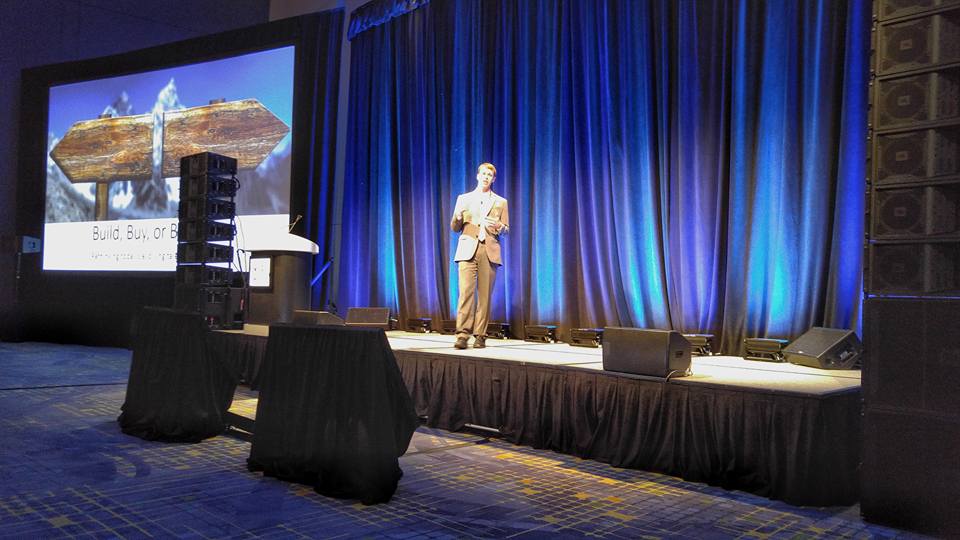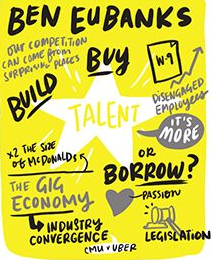If you’re from outside the US and unfamiliar with the term, “keeping up with the Joneses” is a term that focuses on everyone’s desire to compare themselves with their peers, even when it’s emotionally unhealthy. Instead of focusing on our own strengths, we look at what others have or can do, and we want that instead. There’s a business version of this, and we’ve all been guilty of it at one point or another. For example:
- We hear success stories and try to mimic what other companies do. For the last ten years I’ve heard more “we want a culture like Zappos” stories than anything else, even if that request has taken a dip in recent years. The problem is people aren’t willing to put their money on the line to make it happen.
- We find a cool trend and jump on it, hoping for some mythical results. This always reminds me of the goofy “Google interview questions” like how many manhole covers in a city or how many elephants fit in an refrigerator. The questions didn’t predict success on the job, and Google ultimately moved away from them as a selection tool (thank goodness).
- We get word about some new “best practice” through the news, and everyone wants to try it out. This is where I put unlimited paid time off. It’s a hot topic, but there isn’t anything to show how it really helps to improve the workplace other than anecdotal evidence here or there.
Getting Serious about Talent Practices
A few years ago, someone presented locally on HR metrics. The speaker prescribed specific metrics to everyone in the room, telling them that they needed to be capturing data because these were the “most important” measures. The problem? Some attendees were from staffing firms, others were in manufacturing, and still others were in professional services organizations. The truth is there is no “right” number of metrics, especially for such a diverse group. I haven’t forgotten that kind of peanut-butter-spread approach to advice on measurement, and that’s one reason I am going to be working to fix that this year with some of my speaking opportunities.
This week I’m delivering a workshop to an audience of HR leaders around two key topics: measurement and change. As I’ve been creating the slides and activities, one of the messages I’m striving to get across is that we need to be more of an evidence-based practice. That term goes back to roots in the healthcare community, as evidence-based medicine. The purpose is finding a course of action that is based not on gut instinct or hopeful results, but on some sound and proven science.
Imagine going to the doctor with an illness and getting five different recommendations for cures. You’d be a bit annoyed and unsure about how to proceed, right? But this is what we see daily in the HR profession. If you bring up a problem for discussion, you’ll get those same five different cure ideas from your peers, often based on a personal experience, a story of a friend, or something similar. Don’t worry, I’ve been guilty of this as well.
But this year I’m really focusing on being more intentional about my recommendations. I’m going to be focusing more on finding and uncovering evidence to support my approach. I’m actually going to be interviewing an author soon for the podcast on science-based principles of selling as a way to explore how to influence others. The two topics are connected, because he went through the same thing within the selling profession, taking advice of numerous “gurus” or basing practices on personal experience instead of an approach proven by science.
Best Practices? Maybe
I’ll leave you with this: by the time something becomes a “best practice,” the companies that used it often have moved to something else. The Google interview questions I mentioned above are just one example. One of the challenges of being an early adopter is that I see all of the newest and “best” talent and learning practices. I hear about what’s hot and what’s not. But the thing that never goes out of style is gathering data, making a decision based on that information, and then collecting feedback on results to adjust your direction or stay the course in the future.
Create your own book of best practices that fit your organization and its people. That’s the only set of practices that really matter.
 And I LOVE it.
And I LOVE it.

 on-demand workers include Toptal, Shiftgig, Wonolo, Upwork, and others.
on-demand workers include Toptal, Shiftgig, Wonolo, Upwork, and others.